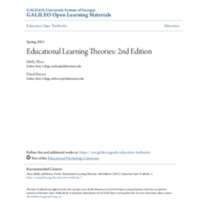Educational Learning Theories: 2nd Edition
Dublin Core
Subject
Description
Behaviorism is primarily concerned with observable and measurable aspects of human behavior. In defining behavior, behaviorist learning theories emphasize changes in behavior that result from stimulus-response associations made by the
learner. John B. Watson (1878-1958) and B. F. Skinner (1904-1990) are the two principal originators of behaviorist approaches to learning. Watson believed that human behavior resulted from specific stimuli that elicited certain responses. Watson's basic premise was that conclusions about human development should be based on observation of overt behavior
rather than speculation about subconscious motives or latent cognitive processes (Shaffer, 2000). Watson's view of learning was based in part on the studies of Ivan Pavlov (1849-1936). Pavlov was well known for his research on a learning process
called classical conditioning.
learner. John B. Watson (1878-1958) and B. F. Skinner (1904-1990) are the two principal originators of behaviorist approaches to learning. Watson believed that human behavior resulted from specific stimuli that elicited certain responses. Watson's basic premise was that conclusions about human development should be based on observation of overt behavior
rather than speculation about subconscious motives or latent cognitive processes (Shaffer, 2000). Watson's view of learning was based in part on the studies of Ivan Pavlov (1849-1936). Pavlov was well known for his research on a learning process
called classical conditioning.
Creator
Source
https://oer.galileo.usg.edu/cgi/viewcontent.cgi?article=1000&context=education-textbooks
Publisher
Date
2015
Contributor
Baihaqi
Rights
Creative Commons
Format
PDF
Language
English
Type
Files
Collection
Citation
Molly Y. Zhou, David Brown, “Educational Learning Theories: 2nd Edition,” Open Educational Resources (OER) , accessed February 15, 2026, https://oer.uinsyahada.ac.id/items/show/2711.


